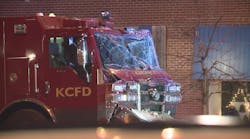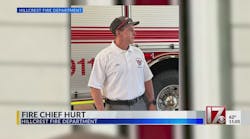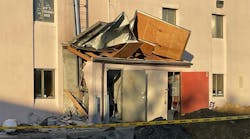Did you know that water does more than put out fires?
A firefighter needs water not only for putting out fires, but to fight dehydration and fatigue when they are on the job. Dehydration is a major concern for members of the fire service or anyone who exercises and works out especially.
Firefighters across the nation have been trained to remain hydrated between alarms while performing other duties. This only makes sense because they never know when they are going to get called to the line of duty.
A fire department can have all the latest gadgets and gizmos, with all the bells and whistles, and still be nothing without healthy and "Fire Fit" firefighters. So for Water 101, this is a pretty big subject to swallow.
Every system in the body depends on water. We can go without food for almost two months, but without water only a few days. Most people have no idea how much water they drink or should drink. Then there are those that say they do but still come up low on the optimal hydration level percent. So just how much water should a firefighter drink each day?
How Much Water Do You Need?
Conventional wisdom has held for years that you should drink eight eight-ounce glasses of water a day. But nobody really knows where this even came about from. Some say the number was derived from fluid intake measurements taken decades ago among hospital patients on IV; others say it's less a measure of what people need than a convenient reference point, especially for those who are prone to dehydration, such as elderly people. However there is no straightforward answer as to how much water or fluid intake is necessary for the human body on a daily basis.
There are a number of factors that need to be considered when trying to determine the proper fluid intake. The level of activity of the individual is a very important factor. The rate at which the body losses fluid by way of perspiration, urination and respiration, which is different for each individual (about 2.5 liters on an average), would make a difference in the intake level of the individual. The overall health of the person would play into this equation and the climate and region in which the person lives also plays an important factor.
Several approaches attempt to approximate water needs for the average person.
Replacement approach: The average urine output for adults is about 1.5 liters (6.3 cups) a day. You will lose close to an additional liter of water through breathing, sweating and bowel movements. You have to remember that food usually accounts for as much as 20 to 25 percent of your total fluid intake, so if you consume two liters of water and beverages a day (a little more than eight cups) along with your normal diet, you should replace the lost fluids.
Health experts and dietitians recommendation: They believe daily intake of water should be about three liters (13 cups) for men and for women around 2.5 liters (about nine cups).
Eight, 8 ounce glass rule: There isn't scientific evidence to support this method, but many people use this as a basic rule for a guideline as to how much water and fluids they should drink daily.
Sports medicine rule: The latest new conventional wisdom from this field is to drink half your body weight in ounces of water. That is if you weigh 120 pounds, you should drink 60 ounces of water everyday, or seven and a half cups. If you weight 180 pounds, you should drink 90 ounces of water daily, or eleven cups and another few sips.
.55 method: You are to drink .55 multiplied by your body weight in ounces of water per day. If you limit your water intake, the body will retain water and make you feel like the "king or queen of bloat" or better yet, a marshmallow. It only takes the body to be dehydrated by two percent for this to take place.
I think easiest method: If you drink fluid throughout the day so that you rarely feel thirsty and produce 1.5 liters (6.3 cups) or more of colorless or slightly yellow, odorless urine a day, your fluid intake is probably adequate. Your exercise requirement will be enhanced by your more frequent visits to the bathroom, just think. No, you do not have to get out the measuring cup either. Most people drink only when they are thirsty, but by the time you feel thirsty, your body may already be dehydrated. Quenching your thirst will only supply about half the fluid your body actually needs. So drink throughout the day, and don't down too much at one time: drinking more than one to two glasses at one sitting stimulates the body to rid itself of the water.
The problem with providing drinking guidelines is that they must be general, as people sweat at different rates for the same tasks, will carry out different tasks on the fireground, produce different amounts of salt on their sweat, have different body sizes (therefore, fluid volume), begin to shift at different states of hydration etc, and therefore will need to drink different amounts to keep hydrated.
Health Benefits Of Drinking Water
Besides being hydrated at the station in preparation to do your job, there are several other benefits you get, plus it is usually inexpensive and readily available.
- regulates appetite
- improves skin
- increases metabolism
- helps reduce cholesterol
- boosts energy levels
- eases joint pain
- less water retention
- decreases the risk of some cancers
- reduces and alleviates headaches
- less of a chance of getting kidney stones
- releases toxic waste products
Water Intake Not Just From Water
So there is no excuse to say I don't like to drink water. Fueling your body can be accomplished by the foods you eat, too. However, water is the best means of filling your tank. The foods and fluids you consume provide 80 to 90 percent of your daily water intake; the reminder is generated through metabolism. Foods all contain some water, but some are surprisingly very good sources.
Fruits and vegetables are 80 percent water, so they can contribute three to four cups toward your fluid intake. Watermelon and oranges each contain more than 85 percent water by weight. Other good choices include apples, peaches, melons, and strawberries.
Certain vegetables such as lettuce, broccoli and carrots are packed with water. Other watery vegetables are celery, cucumbers, corn, green beans, and summer squash.
Other foods that are good fuel fillers are soups, lean chicken and rice. Usually foods high in fat are low in water so stay away from them. Good choices would be low-fat cottage cheese and yogurt. Even grain products, which don't seem watery at all, may be up to one-third water.
Beverages such as milk and juice are also mostly comprised of water. Even beer, wine and caffeinated beverages such as coffee, tea or soda can contribute. I know, I said it, but they should not be a major portion of your daily total fluid intake. These fluids that contain caffeine, which is a mild stimulant, can act as a diuretic. This promotes fluid loss through urination and contributes to dehydration. Water is the best friend you can ask for just remember that.
Why Worry About Your Water Intake?
As you can see, water is not just important for putting out fires it is your body's life line. The point that this brings up is that firefighters need to take care of themselves which starts with the simple task of drinking a few glasses of water, a few more hours in the gym, going through exercises that mimic firefighting tasks. A firefighter can not expect to do their job combating fires if they not "Fire Fit" and hydrated.
So now is the time to think about being prepared for the next alarm by looking at your nutrition and fitness needs as part of a comprehensive wellness, a philosophy that emphasizes the total health and well-being of each individual through active prevention of illness and injury. Look at it this way when you show up to work, you expect your buddy to be able to do his job don't you. Are you able to do yours? Drink on that one.
BECKY SHEREK is a registered nurse and paramedic program coordinator for the Mesabi Range Community and Technical College in Minnesota. Becky holds two masters degrees, one in Community Health Administration and the other in Wellness Promotion and is a contributor to Minnesota Fire Chief Magazine. She started Northern Health & Fitness Plus, a company that provides on-site medical evaluations and respiratory fit testing, among other services, for fire departments in Minnesota. You can contact Becky at [email protected].





